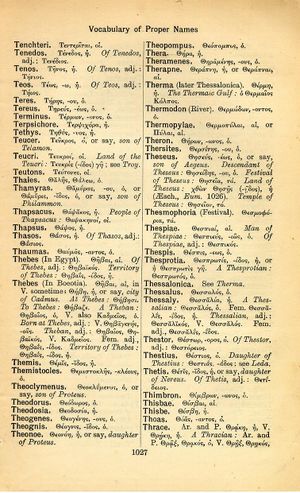Theramenes: Difference between revisions
From LSJ
Μί' ἐστὶν ἀρετὴ τἄτοπον φεύγειν ἀεί → Numquam non fugere inepta , et hoc virtutis est → Die einzge Tugend: meiden, was abwegig ist
(6_16) |
(D_9) |
||
| Line 4: | Line 4: | ||
{{Lewis | {{Lewis | ||
|lshtext=<b>Thērāmĕnes</b>: ae, m., = Θηραμένης,><br /><b>I</b> one of the [[thirty]] tyrants of [[Athens]], [[who]] [[was]] [[put]] to [[death]] for resisting the [[oppressive]] measures of his associates, Cic. Tusc. 1, 40, 96. | |lshtext=<b>Thērāmĕnes</b>: ae, m., = Θηραμένης,><br /><b>I</b> one of the [[thirty]] tyrants of [[Athens]], [[who]] [[was]] [[put]] to [[death]] for resisting the [[oppressive]] measures of his associates, Cic. Tusc. 1, 40, 96. | ||
}} | |||
{{Gaffiot | |||
|gf=<b>Thērāmĕnēs</b>,¹⁴ is ou æ, m. (Θηραμένης), Théramène [un des trente tyrans d’Athènes] : Cic. Tusc. 1, 96. | |||
}} | }} | ||
Revision as of 07:06, 14 August 2017
English > Greek (Woodhouse)
Θηραμένης, -ους, ὁ.
Latin > English (Lewis & Short)
Thērāmĕnes: ae, m., = Θηραμένης,>
I one of the thirty tyrants of Athens, who was put to death for resisting the oppressive measures of his associates, Cic. Tusc. 1, 40, 96.
Latin > French (Gaffiot 2016)
Thērāmĕnēs,¹⁴ is ou æ, m. (Θηραμένης), Théramène [un des trente tyrans d’Athènes] : Cic. Tusc. 1, 96.

